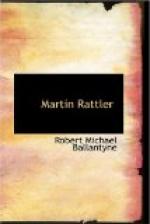“Then as to our produce,” continued the hermit, “who can tell it all? We export sugar, and coffee, and cotton, and gold, silver, lead, zinc, quicksilver, and amethysts, and we have diamond mines—”
“Di’mond mines!” echoed Barney; “och but I would like for to see them. Sure they would sparkle most beautiful. Are they far off, Mr. Carrymooroo?”
“Yes, very far off. Then we export dye-woods, and cabinet-woods, and drugs, and gums, and hides,—a great many hides, for the campos are full of wild cattle, and men hunt them on horseback, and catch them with a long rope called the lasso.”
“How I should like to have a gallop over these great plains,” murmured Martin.
“Then we have,” continued the hermit, “rice, tapioca, cocoa, maize, wheat, mandioca, beans, bananas, pepper, cinnamon, oranges, figs, ginger, pineapples, yams, lemons, mangoes, and many other fruits and vegetables. The mandioca you have eaten in the shape of farina. It is very good food; one acre gives as much nutriment as six acres of wheat.
“Of the trees you have seen something. There are thousands of kinds, and most magnificent. Some of them are more than thirty feet round about. There are two hundred different kinds of palms, and so thick stand the giant trees in many places, with creeping plants growing between, that it is not possible for man to cut his way through the forests in some parts. Language cannot describe the grandeur and glory of the Brazilian forests.
“We have numbers of wild horses, and hogs, and goats; and in the woods are tiger-cats, jaguars, tapirs, hyenas, sloths, porcupines, and—but you have seen many things already. If you live you will see more. I need not tell you of these things; very soon I will show you some.
“The population of my country consists of the descendants of Portuguese settlers, native Indians, and Negroes. Of the latter, some are free, some slaves. The Indians go about nearly naked. Most of them are in a savage state: they paint their skins, and wear gaudy ornaments. The religion of the country is Roman Catholic, but all religions are tolerated; and I have much hope for the future of Brazil, in spite of the priests.”




